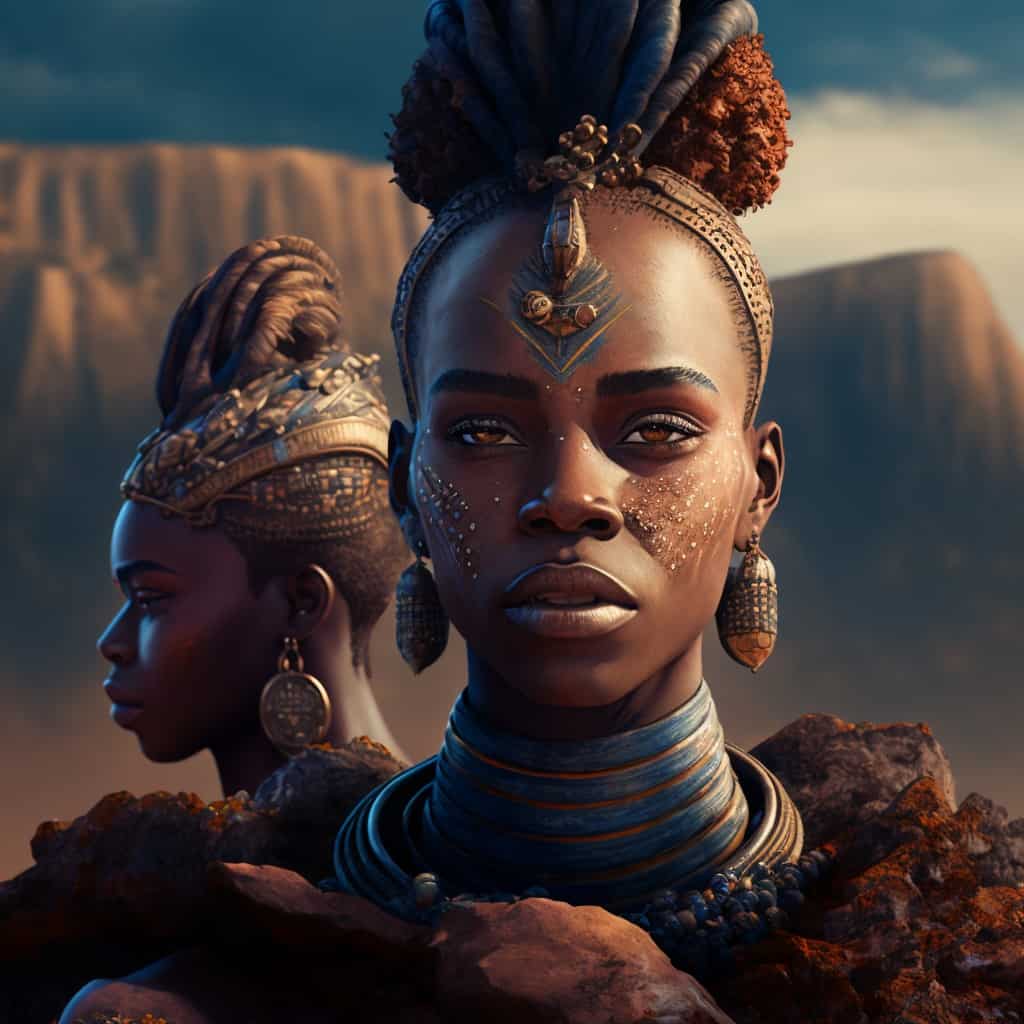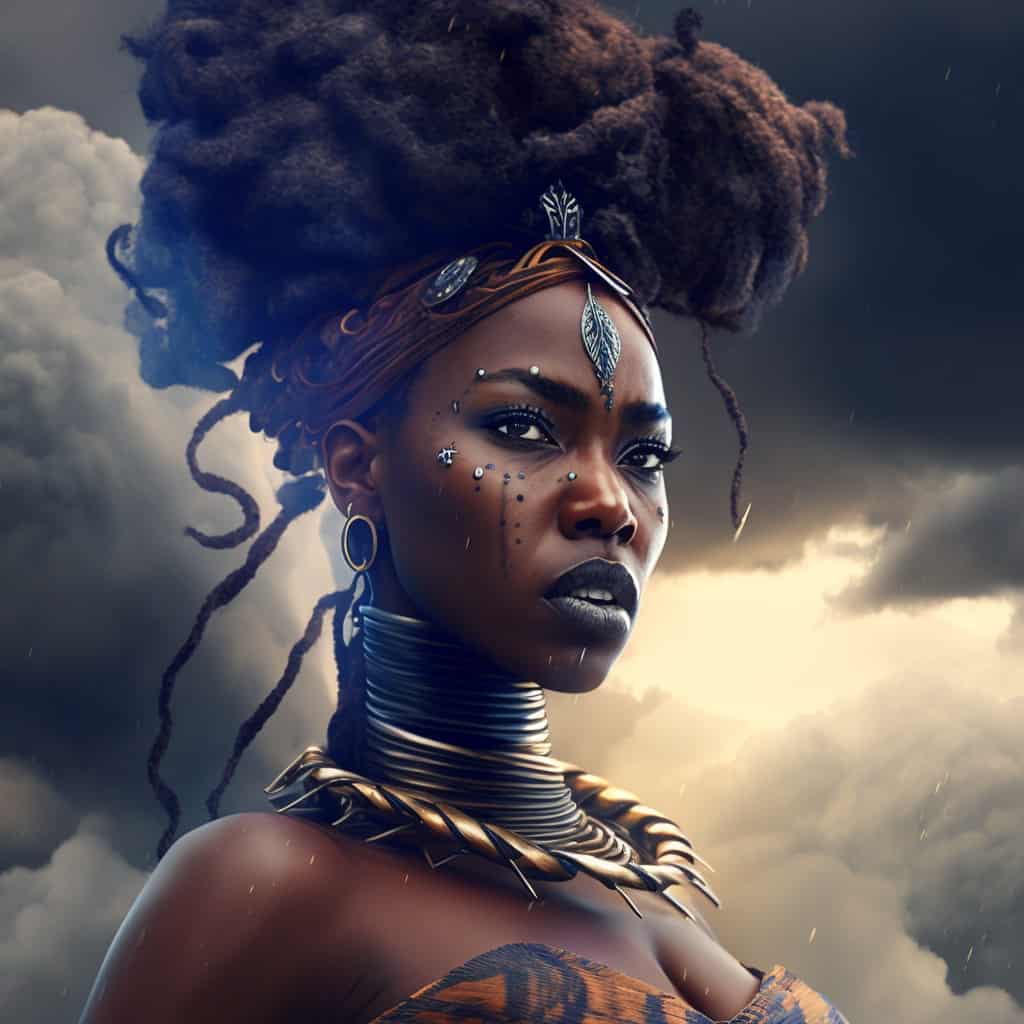Step into the world where myths come alive, where the whispers of ancient times echo through generations. African goddesses and gods are more than just legends; they're the heartbeat of a rich cultural heritage that has shaped the identity of an entire continent. These divine beings aren't just figures in folklore; they're symbols of power, wisdom, and resilience that continue to inspire millions today.
When you dive into the realm of African deities, you're not just exploring mythology—you're uncovering the soul of a people. These gods and goddesses represent the hopes, fears, and dreams of communities that have thrived for centuries. From the majestic goddesses of fertility to the powerful gods of thunder, each deity tells a story that resonates with the human experience.
So, buckle up, because we're about to embark on a journey through time and space. We'll explore the rich tapestry of African mythology, meet some of the most iconic deities, and uncover the secrets behind their enduring legacy. This isn't just a story—it's a celebration of culture, spirituality, and the divine.
Read also:Maelle Eto Rising Star In The World Of Football
Understanding African Goddesses and Gods: A Deep Dive
First things first, let's break down what makes African goddesses and gods so special. Unlike the gods of ancient Greece or Rome, African deities are deeply intertwined with the natural world. They're not just distant figures sitting on celestial thrones; they're part of everyday life, influencing everything from weather patterns to family dynamics. So, when we talk about African mythology, we're not just talking about stories—we're talking about a way of life.
Here's the kicker: African mythology isn't monolithic. It's a vibrant mosaic of beliefs and practices that vary from region to region. What you'll find in West Africa might be completely different from what you'll discover in East or Southern Africa. And that's what makes it so fascinating! Each culture brings its own unique flavor to the table, creating a rich tapestry of divine beings that reflect the diversity of the continent.
Key Features of African Deities
Now, let's get into the nitty-gritty. What sets African goddesses and gods apart from other mythological systems? For starters, they're incredibly relatable. These deities aren't perfect beings; they have flaws, desires, and sometimes even petty arguments. Sound familiar? That's because African mythology reflects the human condition in all its messy glory.
- Connection to Nature: African deities are often tied to natural elements like rivers, mountains, and the sky. Think of Oshun, the Yoruba goddess of rivers and love, or Shango, the god of thunder and lightning.
- Family Dynamics: Many African myths explore the complexities of family relationships. Gods and goddesses often have intricate family trees, with stories of sibling rivalries, parental love, and generational conflicts.
- Symbolism: Every deity is a symbol of something bigger. Whether it's fertility, strength, or wisdom, these gods and goddesses embody the values and aspirations of their communities.
Biographies of Iconic African Goddesses
Let's take a moment to meet some of the most iconic African goddesses. These ladies aren't just pretty faces—they're forces to be reckoned with. From the nurturing mother figures to the fierce warriors, each goddess has a story that will leave you in awe.
Mami Wata: The Mystical Water Goddess
Mami Wata is a name that resonates across West and Central Africa. This water goddess is often depicted as a mermaid-like figure, embodying the mysteries of the deep. She's a symbol of fertility, wealth, and healing, and her influence can be seen in various cultures across the continent.
| Name | Role | Region |
|---|---|---|
| Mami Wata | Water Goddess | West and Central Africa |
Oshun: The Goddess of Love and Rivers
Who doesn't love a good love story? Enter Oshun, the Yoruba goddess of love, beauty, and fertility. She's the keeper of the rivers, bringing life and abundance wherever she flows. Oshun's story is one of resilience and grace, reminding us that love is a powerful force that can overcome any obstacle.
Read also:Male Actors A Visual Journey Through Stunning Images
Exploring the Male Pantheon: African Gods
Now, let's shift gears and talk about the guys. African gods are just as fascinating as their female counterparts, each with their own unique powers and stories. From the thunderous Shango to the wise Obatala, these deities represent the strength and wisdom of African cultures.
Shango: The God of Thunder
Shango is a name that commands respect. As the god of thunder, he's a symbol of power and authority. His stories are filled with epic battles and dramatic encounters, making him one of the most popular deities in African mythology.
Obatala: The Creator God
Obatala is the big boss of the Yoruba pantheon. He's the creator of humanity, embodying wisdom, justice, and purity. His stories teach us the importance of balance and harmony in life, reminding us that even the most powerful beings must adhere to moral principles.
The Role of African Goddesses and Gods in Modern Culture
So, you might be wondering, "Do people still worship these deities today?" The answer is a resounding yes! African goddesses and gods continue to play a significant role in modern culture, influencing everything from art and music to spirituality and identity.
In many parts of Africa, traditional beliefs coexist with modern religions like Christianity and Islam. People find ways to incorporate the wisdom of ancient deities into their daily lives, creating a unique blend of old and new. This fusion of traditions is a testament to the enduring power of African mythology.
Modern Art and Music Inspired by African Deities
Artists and musicians across the globe are drawing inspiration from African goddesses and gods. From paintings that capture the essence of Mami Wata to songs that pay homage to Shango, these creative expressions keep the legacy of African mythology alive. It's a beautiful reminder that the divine can transcend time and space.
How African Goddesses and Gods Impact Daily Life
Let's talk about the practical side of things. How do African goddesses and gods influence the lives of ordinary people? The answer lies in the values they represent. These deities serve as moral compasses, guiding people through life's challenges and triumphs.
For example, the story of Oshun teaches us the importance of love and compassion in relationships. Shango's tales remind us to stand up for justice and fairness. And Obatala's wisdom encourages us to seek balance and harmony in all aspects of life. These lessons are as relevant today as they were thousands of years ago.
Practical Applications of Mythology
- Conflict Resolution: Many African myths offer insights into resolving conflicts peacefully, emphasizing the importance of dialogue and understanding.
- Community Building: Deities like Mami Wata inspire people to come together and celebrate their shared heritage, fostering a sense of community and belonging.
- Personal Growth: The stories of African goddesses and gods can serve as powerful metaphors for personal development, encouraging individuals to embrace their strengths and overcome their weaknesses.
The Scientific Perspective: Mythology and Psychology
Now, let's bring in the science. How do psychologists and anthropologists view African mythology? It turns out that myths and legends play a crucial role in shaping human behavior and identity. They provide a framework for understanding the world and our place in it.
Studies have shown that engaging with mythology can have therapeutic benefits, helping people process emotions and make sense of life's complexities. African goddesses and gods, with their rich stories and diverse personalities, offer a wealth of material for exploration and reflection.
Research and Studies
According to a study published in the Journal of Cultural Psychology, myths like those of African deities can enhance emotional resilience and social cohesion. Researchers found that individuals who engage with these stories tend to have a stronger sense of identity and purpose, highlighting the enduring relevance of ancient mythology in modern times.
Challenges and Misconceptions
Of course, no discussion of African goddesses and gods would be complete without addressing the challenges and misconceptions surrounding them. Over the years, these deities have faced misrepresentation and misunderstanding, often due to cultural biases and lack of awareness.
One common misconception is that African mythology is primitive or outdated. Nothing could be further from the truth! These stories are rich in wisdom and complexity, offering insights that are as relevant today as they were in ancient times.
Breaking Stereotypes
Efforts are being made to correct these misconceptions, with scholars and artists working to present a more accurate and nuanced view of African mythology. Through books, films, and online platforms, the true stories of African goddesses and gods are reaching a wider audience, challenging stereotypes and promoting cultural understanding.
Conclusion: Celebrating the Divine
As we wrap up our journey through the world of African goddesses and gods, let's take a moment to reflect on what we've learned. These deities are more than just figures in folklore; they're powerful symbols of culture, identity, and spirituality. They remind us of the beauty and complexity of human experience, offering lessons that transcend time and space.
So, the next time you hear the name Mami Wata or Shango, remember the rich stories and traditions they represent. And if you're inspired by what you've read, why not share this article with a friend? Together, we can celebrate the divine and keep the legacy of African mythology alive for generations to come.
Table of Contents
- Understanding African Goddesses and Gods: A Deep Dive
- Biographies of Iconic African Goddesses
- Exploring the Male Pantheon: African Gods
- The Role of African Goddesses and Gods in Modern Culture
- How African Goddesses and Gods Impact Daily Life
- The Scientific Perspective: Mythology and Psychology
- Challenges and Misconceptions
- Conclusion: Celebrating the Divine


